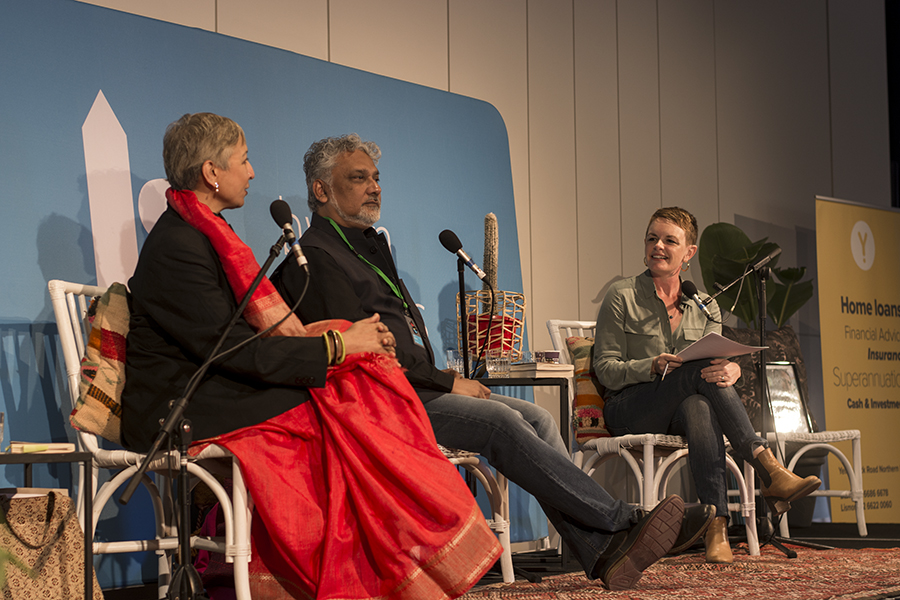Focus on Indian literature makes for diverse reading

Indian authors are sometimes seen by the West as a homogenous group, but the truth is that India is a vastly diverse continent, and Kunal Basu and Vayu Naidu personify the differences of this colourful continent.
Session chair Sarah Kanowski, recording the session for her program on ABC RN Books and Arts, was curious about the two authors’ background.
Kanal Basu was born in Calcutta to a Bengali intelligentsia family and his birth is the quintessential author’s delivery into the world.
‘My mother, a famous Indian author, did not want to leave her nearly finished manuscript to go to the hospital –”just one more chapter!”, Basu said.
‘Until finally, it was too late to go to the hospital, and I was delivered by my aunt on the library floor, surrounded by books.’
Novelist, playwright, performance storyteller and research associate, Vayu Naidu was born in Delhi to a military family in a house that was ‘ordered, supportive of writing without discussion – everything was there, but I had to find my own way.’
Born in the time of transition between the British Raj and Independence, Naidu was in many ways an outsider. Her family had moved from the south of India to the north, and moved around often, following her father’s military posts.
Naidu described her mother as a ‘mimic who wrote plays to entertain the army wives’, and her father as a ‘brilliant raconteur with a vivid imagination’. And from this upbringing, she was trained in oral storytelling techniques by a Baul storyteller in the Bengali lineage.
Her most recent novel, The Sari of Surya Vilas, is an historical story that examines the traditions of women in the South, where the matrilineal traditions are strong, but where the way they communicate and carry traditions from one woman to the next is by necessity symbolic rather than overt.
‘The sari represents women’s histories which are not able to be spoken, but are part of an oral tradition woven into tapestry,’ Naidu explained.
At the other end of the historical scale is Basu’s most recent novel Kalkutta, a contemporary novel set in the book’s namesake city of Calcutta. Its main character is a refugee who gets work as a gigolo – he’s an outsider, but one who dreams of being an insider.
Basu was inspired by some of the people he saw on the Calcutta streets
‘Whatever city I live in, I try to not own a car,’ Basu said, ‘because I like to walk around and inhabit the city in a different way.
‘Some years ago I was walking around Calcutta, and came across some good looking guys on motorbikes hanging out in an alleyway. I discovered that they were travel guides and gigolos, a way of life that I knew nothing about.’
His interest was piqued, and after that introduction, he immersed himself in their world for two years, and from that experience, Kalkutta was born.
Sarah Kanowski noted: ‘It is a great thing for a novel that makes your own home strange.’ And for both of our authors, that has been a strong motivating force for writing.
‘We are told to write what we know,’ Basu told us, ‘but I am bored with what I know. I want to write about a world that I don’t know about – I want to write a novel about Australia!’
Sara Runciman is a Southern Cross University Bachelor of Digital Media and Communications student.
